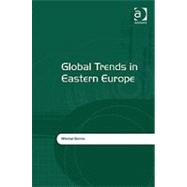Global Trends in Eastern Europe
, by Genov,Nikolai- ISBN: 9781409409656 | 1409409651
- Cover: Hardcover
- Copyright: 10/28/2010
Eastern Europe was once clearly defined by the centralised political and economic organisation of the societies in the region. They shared the same official ideology and were members of the same alliances. After 1989, the region collapsed in an economic, political and cultural implosion. What were the moving forces of this profound change? What are its consequences and could we try to reasonably foresee any future developments? In this thought provoking book, Nikolai Genov presents a systematic description and explanation of Eastern European societal transformations after 1989. The changes experience in Eastern European societies are interpreted as adaptations to four global trends; upgrading the rationality of organizations, individualization, spreading of instrumental activism and universalization of value-normative systems. Adaptations to these trends have generally been successful however Genov notes that process has many failed characteristics as well. Mostly caused by path dependency in the societal development and by the varying quality of relevant decisions other destructive developments are due to contradictions in the global trends themselves. Guided by the assumption that the societal and supranational integration mechanisms in Eastern Europe before 1989 could not resist the overwhelming power of global trends, Genov's controversial findings question visions about the end of history and simultaneously strengthen the confidence that most complex macro-social processes can be rationally managed. A timely book allowing for a much needed engagement in contemporary debates on the sociological processes of Eastern European transitions.







